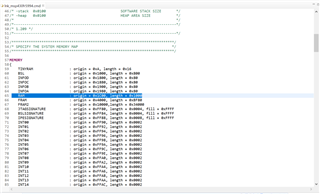Hello,
my software needs more than 4 Kbytes of RAM. LEA is not required. I would like to use the RAM of the LEA through the programme. Unfortunately, inexplicable changes of the content happen in this RAM area. I found this article: "">e2e.ti.com/.../msp430fr5994-can-i-combine-4kb-lea-ram-with-sram-into-a-single-8kb-block-of-ram". I was able to extend the RAM area. In the properties of the project in CodeComposerStudio, I entered the following in Build/MSP430-compiler/Predefined Simbols: MSP_DISABLE_LEA. Unfortunately, this did not help. Do I have to switch off the LEA directly? How does that work exactly?
Best Reagards
Hardy




